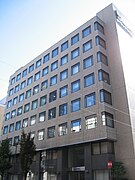Shimadzu
  | |
Native name | 株式会社 島津製作所 |
|---|---|
| Company type | Public KK |
| TYO: 7701 OSE: 7701 | |
| Industry | Precision Instruments |
| Founded | Kyoto, Japan (1875) |
| Founder | Genzo Shimadzu |
| Headquarters | 1, Nishinokyo-Kuwabara-cho, Nakagyo-ku, Kyoto 604-8511, Japan |
Area served | Worldwide |
Key people | Akira Nakamoto, (CEO and President) |
| Products | Scientific, medical , aircraft and industrial instruments |
| Revenue | $ 2.8 billion (FY 2012) (¥ 264.048 billion) (FY 2012) |
| $ 80.6 million (FY 2012) (¥ 7.578 billion) (FY 2012) | |
Number of employees | 10,395 (as of March 31, 2013) |
| Website | Official website |
| Footnotes / references [1][2] | |
Shimadzu Corporation (株式会社 島津製作所, Kabushiki-gaisha Shimadzu Seisakusho) is a Japanese public KK company, manufacturing precision instruments, measuring instruments and medical equipment, based in Kyoto, Japan. It was established in 1875.[3] The American arm of the company, Shimadzu Scientific Instruments, was founded in 1975.[4]
History
Founding and early years
The company was established by Genzo Shimadzu (島津 源蔵, Shimazu Genzō) in 1875.[3] X-ray devices, the spectrum camera, the electron microscope, and the gas chromatograph were developed and commercialized in advance of other Japanese companies. The American arm of the company, Shimadzu Scientific Instruments, was founded in 1975.[4]
Recent developments
In 2002, Koichi Tanaka, a longstanding employee, won the Nobel Prize in Chemistry for developing a method of mass spectrometric analysis of biological macromolecules.
The company also developed, in 2005, an ultra-high speed video camera, HyperVision HPV-1, which is capable of recording at 1,000,000 FPS,[5][6] while in 2014 it released the HyperVision HPV-X, a camera that achieves ultra-high-speed continuous recording at 10 million frames per second.[7][8] Other products developed by Shimadzu include head-mounted displays.[9]
Shimadzu is the world's only producer of a "Direct-Conversion" Flat Panel Detector for Cardiac, Angiography and General Radiography examinations.[10]
The company had revenue of ¥264.048 billion yen ($2.8 billion USD) in FY 2012, with 10,395 employees as of March 31, 2013.[1][2]
Gallery
Buildings
-
Shimadzu Foundation Memorial Hall in the Nakagyo-ku ward of Kyoto in 2006
-
Shimadzu office building in Tokyo
Products
-
Shimadzu's Prominence HPLC HPLC system in 2009
-
Inside the cover of a Shimadzu Ion Trap-Time of Flight mass spectrometer in 2008. Visible are power supplies, circuit boards, the flight tube, ion gauges etc.
-
2009 MALDI mass spectrometer (in the Applications Lab of Shimadzu Scientific Instruments, Columbia, MD)
See also
References
- ^ a b "Corporate Profile". Retrieved April 16, 2014.
- ^ a b "Annual Report 2013" (PDF). Archived from the original (PDF) on March 27, 2014. Retrieved April 16, 2014.
{{cite web}}: Unknown parameter|deadurl=ignored (|url-status=suggested) (help) - ^ a b Goto, Kazuko (2012). "Craft and creativity: New economic spaces in Kyoto". New Economic Spaces in Asian Cities: From Industrial Restructuring to the Cultural Turn. Routledge.
- ^ a b Swartz, Michael E. (2000-02-18). Analytical Techniques in Combinatorial Chemistry. CRC Press. pp. 278–279. ISBN 9780203909966.
- ^ A page about HyperVision HPV-1 on official site
- ^ Gareth Edwards (March 29, 2005). "Shimadzu's million-frame-per-second video camera". Engadget. Retrieved April 16, 2014.
- ^ "A World's First - Journey to Unknown Realms of High Resolution and Ultra-High Speeds". Shimadzu. Retrieved April 17, 2014.
- ^ Jesus Diaz (March 21, 2014). "Watch a ball breaking glass filmed at 10 million frames per second". Sploid. Retrieved April 17, 2014.
- ^ Shimadzu Data Glass 3/A Archived June 29, 2007, at the Wayback Machine
- ^ Safire FPD technology Archived May 1, 2008, at the Wayback Machine
External links
- Electronics companies of Japan
- Manufacturing companies of Japan
- Defense companies of Japan
- Instrument-making corporations
- Laboratory equipment manufacturers
- Medical equipment manufacturers
- X-ray equipment manufacturers
- Research support companies
- Companies based in Kyoto
- Manufacturing companies established in 1875
- 1875 establishments in Japan
- Japanese brands
- Companies listed on the Tokyo Stock Exchange
- Companies listed on the Osaka Securities Exchange





